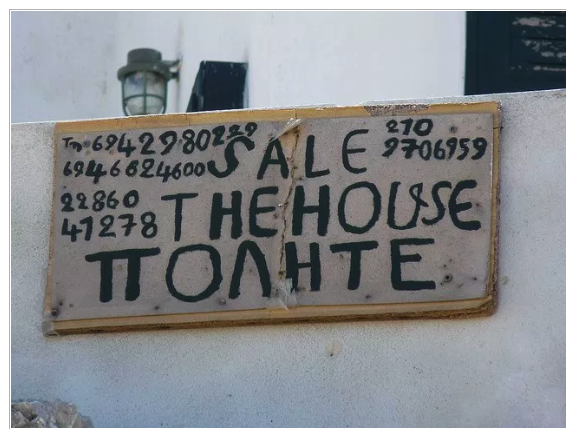As an expat, negotiating anything involving the bureaucracy in Greece can be daunting and unnerving. Having experienced the bureaucracy, one views any further forays into its recesses – or even open planning, as it were – fills one with a certain amount of foreboding.
 Such it is when deciding to look for a property to buy, especially as one has a limited amount of time to find a house. (Brexit on the horizon has a lot to answer for, as do the politicians who support it!)
Such it is when deciding to look for a property to buy, especially as one has a limited amount of time to find a house. (Brexit on the horizon has a lot to answer for, as do the politicians who support it!)
So recently, I found myself in a situation in which it had become necessary to buy somewhere to live.
It’s stressful enough to contemplate moving all one’s worldly goods to a different location, without being in the unenviable position of not knowing how to go about house buying.
There aren’t as many estate agents here in Greece as there are in towns in the United Kingdom. There are only a few that serve the areas outside the main conurbations. That being so, it would be easy to suppose that house buying would be easy! Of course, properties being sold by an estate agent are all online, but if you are in the area where you would like to buy a property, then you can see individually made signs advertising properties for sale and rent.
First obstacle – the language
One of the problems expats have when trying to buy a house directly from an owner is the language. Even when you have a Greek native speaker with you, difficulties can arise.
In the UK, and no doubt in the rest of Europe, all you have to do is find a property that you like, arrange to view it, and then decide whether or not it’s suitable. You. or your solicitor will do a check to see if there are any problems, and this can be done via the Land Registry.
Easy, right?!
I should say that what seems easy to an expat often isn’t in practice.
When I first started living in Greece, I realised that when a Greek said, “No problem,’”there was one I hadn’t thought of (and it was probably a huge one).
So there I was, househunting in Greece for the first time. I was lucky before because accommodation came with the job. The apartments I lived in weren’t great by any means, but they were better than nothing! I did once have an apartment that was not provided by an employer, but a friend found it for me a stone’s throw away from where I worked. I lived there very happily until I left Greece and headed to Pakistan.
Finding a home
As I no longer had to work in Athens, I thought it might be better to live in the sticks, and anyway, I wanted to be close to my favourite mountain.
I’ve always thought that if something seems too good to be true, it probably is, but I allowed myself to be temporarily beguiled.
I found a perfect property online, but the price was so low that there just had to be something wrong with it. However, the estate agent assured me that the house could be sold and insisted that he was in possession of the papers which proved that. I asked to see them, but he demurred, so I said that was fine, but he would have to produce them for my lawyer who would be checking the legal status of the property himself.
Then, before I had time to speak with my lawyer in Athens face-to-face, the estate agent asked for a deposit of 2,000 euros as the owner wanted it placed in his foreign bank account (the story was, he doesn’t live in Greece any longer).
I told the agent that all transactions would be done through my lawyer. That was more or less the last I heard from him! My lawyer later explained that the estate agent had asked for a “deposit” of 2,000 euros as that would have been his “commission” if the sale had gone through. He must have thought I was extremely gullible.
That is a common misperception of some Greeks when dealing with foreigners, and one to be aware of.
My lawyer did his job very efficiently and found that although it was true that the house was clear to sell (bear with me and I’ll explain the registry issues below), if I were to buy it I would not be able to do the necessary repairs to it. I would not be able to get a building permit, so whatever was done after the purchase would be illegal.
This was of particular importance after the fire in Mati, Attica, in July 2018 which claimed about 100 lives. The subsequent investigations showed that illegal building work was at least partly, if not totally, to blame for the deaths of so many people.
Needless to say, I didn’t buy that house and am still looking for another property.
Learn from my initial mistake
I was understandably furious with the estate agent, but there was little I could do except make sure that people in the area were aware of his attempt to con me out of 2,000 euros. After this event, I wondered if I could report him to a professional association of estate agents. I wasn’t very surprised to find that he was not a member of any such organization, or at least there was no indication of this on his website.
Clearly, I should have checked this out before attempting to do business with him.
The professional bodies for estate agents are The Hellenic Association Of Realtors abbreviated to SEK in Greek and HAR in English. This is the link to their LinkedIn page. This link gives some tips for foreigners wishing to buy property in Greece.
Three essential tips for expat house buyers:
• Hire your own lawyer, not one recommended by the estate agent. Find another expat who has bought a property in Greece and ask them to recommend a good lawyer. You don’t even want to suspect that there may be a conflict of interest. Your lawyer doesn’t need to work in the area where you are buying a property. Of course, it’s cheaper if he or she is local, as there will be fewer travel expenses for you to pay, but you don’t want any mistakes.
• Ask around and find your own architect/surveyor to inspect the property before you make an offer. Again, this will avoid a conflict of interest. All too often, estate agents and builders will recommend their friends and cronies.
• Check and double check all information and rely on your lawyer’s advice.
Greek Land Registry
Until recently there appears not to have been a Land Registry in Greece. Now that has changed, although one wonders if all properties are properly registered. They should be, but then this is Greece.
Greeks with olive trees and other farm-type property have had their land passed down through their families for generations. There were not necessarily title deeds for land. Now, however, families must register their claims to land.
Property disputes
In the past the family handed the property down to their children. This is often to be shared equally between them. Sometimes, however, the property is handed down to the eldest son, who is expected to help his siblings.
Unfortunately, this often gives rise to familial disputes.
Would-be property buyers need to hire a lawyer who should be engaged to find out what claims there are on a property. No one wants to become embroiled in property disputes, claims and counter-claims when attempting to negotiate the purchase of a house. Of course, if you are buying a new house, this doesn’t happen, but there are other legal matters to sort out.
I also learned that just because the property is on the grid, doesn’t necessarily mean that it was built legally. Some Greeks build a μαντρί or barn for animals before converting it into a residential property. If the animals are goats, for example, there must be running water and electricity for milking purposes. It is then a question of the owner biding his time before turning the “goat house” into a home for himself.
I hope this article gives expats an idea of what it is like to attempt to buy a residential property in Greece.
I hope you have better luck than I did at my first attempt!
 About the author:
About the author:
Lynne Evans is originally from Wales but is an inveterate traveller. She is passionate about writing and feels compelled to write something every day.
Lynne has visited many countries in Europe and South Asia. Working as a freelance writer gives her opportunities to travel.
She’s currently living in her favourite country, Greece, in Athens. In the past, she was always leaving Greece and then returning. This time she wants to stay, despite the economic situation.
Here are more of Lynne’s travel posts:
Lynne Evans on Greece wildfires: ‘We can’t keep destroying Athens’ environment’
Lynne Evans in Athens: More tips to navigating the expat life in Greece
Lynne Evans: The trials, tribulations and absolute pleasures of living in Greece
Lynne Evans: The unvarnished truth about living in Greece














